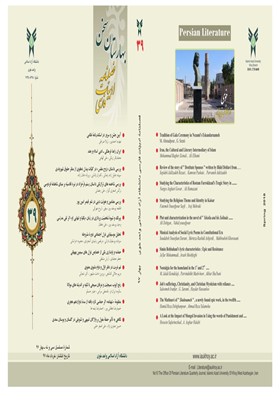Review of the story of " Destitute Spouses " written by Bidel Dehlavi from the view point of Citizenship Rights
Subject Areas : Abstract ArticlesSepideh Jalilzadeh Rezaei 1 , Kamran Pashaei Fakhri 2 * , Parvaneh Adelzadeh 3 *
1 - Department of Persian Language and Literature, Tabriz Branch, Islamic Azad University, Tabriz, Iran.
2 - Department of Persian Language and Literature, Tabriz Branch, Islamic Azad University, Tabriz, Iran.
3 - Department of Persian Language and Literature, Tabriz Branch, Islamic Azad University, Tabriz, Iran.
Keywords:
Abstract :
Abstract Persian Literature is a boundless ocean in various sciences and technologies and a collection of intellectual and cultural resources for our nation. Poets have always tried to reflect on its various social, cultural, economic and legal issues. For this reason, their knowledge in literature is inevitable for the recognition of the nations and cultures. Bidel Dehlavi, one of the great literary figures in the Indian Style, by creating unique masterpieces, shines in Persian Literature and mysticism. In this article we'll look at the story of Bidel from different aspects of law such as ; criminal justice, evidence expressed in implementing the court sentences and the need to reexamine them. The authors of this paper will follow two important goals for their research; instances of crime in the story and its conformity with the Islamic law. One important issue is looking at the world of literature and comparative studies of jurisprudence. Second, looking at the society in which the violation of the rights of lower class citizens takes place without attention to the fundamental principles of Islamic society, causing anarchy, widespread injustice and provide subsequent revelation of divine retribution.
فهرست منابع و مآخذ
الف- کتابنامه
1- قرآن کریم
2- اردبیلی، محمّدعلی، (1390)، حقوق جزای عمومی، ج2، تهران، نشر میزان، چاپ بیست و پنجم.
3- ایمانی، عبّاس، (1382)، جرم شناسی در ادبیّات، تهران،آرویج
4- بیدل دهلوی، عبدالقادر، (1376)، کلیّات بیدل دهلوی ، تصحیح اکبر بهادروند، تهران، الهام، چاپ اوّل.
5- بیدل دهلوی، عبدالقادر، (1378)، گزیدة غزلیّات بیدل، سعید یوسف نیا، تهران، قدیانی.
6- بیدل دهلوی، عبدالقادر،(1386)، رباعیّات بیدل دهلوی، تصحیح پرویز عباسی داکانی، تهران، الهام.
7- جعفری لنگرودی، محمّدجعفر، (1367)، ترمینولوژی حقوق، تهران، کتابخانه گنج دانش.
8- حسینی نیک، سیّدعبّاس، (1390)، قوانین کاربردی مجد، تهران، مجد.
9- رحیمی نژاد، اسمعیل، (1390)، جرم شناسی ، تبریز، فروزش ، چاپ دوّم.
10- سانسون، (1967)، سفرنامه سانسون، تهران، نشر نی.
11- سیّدحسینی، رضا، (1393)، مکتبهای ادبی، جلد اوّل، تهران، موسّسة انتشارات نگاه، چاپ هجدهم.
12- صادقی، میرمحمّد، (1391)، جرایم علیه اشخاص، تهران، میزان، چاپ نهم.
13- صانعی، پرویز، (1382)، حقوق جزای عمومی، تهران، طرح نو.
14- عمید زنجانی، عبّاسعلی، (1388)، آیات الاحکام، تهران، مجد.
15- غفاری فرد، عبّاسقلی، (1388)، تاریخ سخت کشی، تهران، نگاه.
16- مدنی، سیّدجلاالدّین، (1386)، ادلّة اثبات دعوی، تهران، پایدار.
17- معین، محمّد، (1384)، فرهنگ فارسی معین، تهران، اَدِنا، چاپ سوم.
18- نوائی، عبدالحسین، (1370)، اسناد و مکاتبات تاریخی از تیمورشاه تا شاه اسماعیل، تهران، علمی فرهنگی.
19- نوربها، رضا، (1390)، حقوق جزای عمومی، تهران، گنج دانش.
ب)- مقالات
21- محمودی، عابدپور، مریم، محمود، (1389) «بازبینی داستان شیر و گاو در کتاب کلیله و دمنه از منظر حقوق کیفری» پژوهشنامه زبان و ادب فارسی(گوهرگویا)، سال چهارم، شماره چهارم، پیاپی16، زمستان، صص137-156.
22- رحیمینژاد، اسمعیل، (1387) «مجازاتهای مغایر با کرامت انسانی» فصلنامة حقوق، (1387)، مجلّة دانشکدة حقوق و علوم سیاسی، دورة38، شماره2، ص133-115.
23- هاشمیان، لیلا؛ رشیدی، فریبا، (1389) «صائب و انتقادهای اجتماعی او» فصلنامة زبان و ادب فارسی، 1389، سال دوم، شمارة 5، دانشکدة علوم انسانی، دانشگاه آزاد اسلامی واحد سنندج، ص136-115.
ج)- پایان نامه
24- جودکی، محمّدعلی، (1387) «آسیب شناسی اجتماعی جامعه ایران در عصر صفوی و تأثیر آن بر سقوط حکومت صفوی» دانشگاه شهید چمران اهواز، دانشکده ادبیّات و علوم انسانی
_||_
